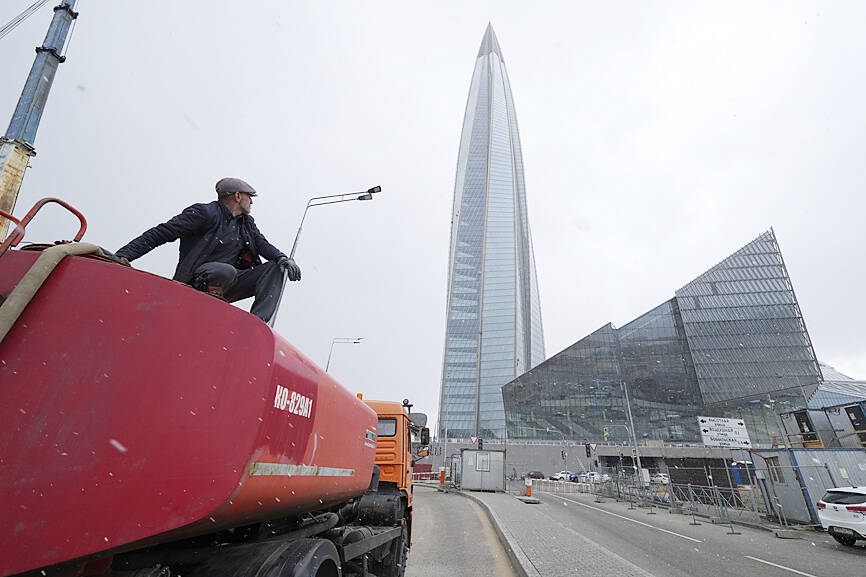Russia’s state-owned gas company Gazprom early yesterday suspended gas deliveries via Ukraine, Vienna-based utility OMV said, in a development that signals a fast-approaching end of Moscow’s last gas flows to Europe.
Russia’s oldest gas-export route to Europe, a pipeline dating back to Soviet days via Ukraine, is set to shut at the end of this year.
Ukraine has said it would not extend the transit agreement with Russian state-owned Gazprom to deprive Russia of profits that Kyiv says help to finance the war against it.

Photo: AP
Moscow’s suspension of gas for Austria, the main receiver of gas via Ukraine, means Russia now only supply significant gas volumes to Hungary and Slovakia, in Hungary’s case via a pipeline running mostly through Turkey. In contrast, Russia met 40 percent of the EU’s gas needs before Moscow’s 2022 invasion of Ukraine.
Austrian Chancellor Karl Nehammer on Friday said that Gazprom’s notice of ending supplies was long expected and Austria has made preparations.
“No home will go cold ... gas-storage facilities are sufficiently full,” he told reporters.
Ukrainian Minister of Foreign Affairs Andrii Sybiha wrote on X that Russia’s action showed it “once again uses energy as a weapon,” but Austria would find a way to ensure energy security and “reject blackmail.”
“The era of Europe relying on Russian gas is over,” he said. “Time to fully cut Russian energy profits — and war funding.”
OMV said it has been preparing for the eventual cut-off of Russian gas and can deliver gas to its customers by importing via Germany, Italy and the Netherlands.
The announcement follows a contractual dispute between Gazprom and OMV.
Gazprom’s move might fan concerns in Austria about heating through the winter and served as Moscow’s rebuke to its political class since the Russia-friendly Freedom Party was cut out of coalition talks after winning September’s election, said Ulrich Schmid, a professor of Eastern European studies at the University of St Gallen.
European and global gas prices spiked following a drop in Russian pipeline supplies in 2022, but some European countries found alternative sources, including liquefied natural gas from the US, which has become the world’s top gas producer and is expected to expand production.
Meanwhile, Ukrainian President Volodymyr Zelenskiy said in a radio interview aired yesterday that Ukraine must do all it can to ensure the war with Russia ends next year through diplomacy.
On Friday, Zelenskiy said that the war would “end sooner” than it otherwise would have done once US president-elect Donald Trump takes office in January next year.
“It is certain that the war will end sooner with the policies of the team that will now lead the White House. This is their approach, their promise to their citizens,” Zelenskiy said in an interview with Ukrainian public broadcaster Suspilne.
In yesterday’s interview, he said he would only speak with Trump directly and not any emissary or adviser.
“From our side, we must do everything so that this war ends next year, ends through diplomatic means,” Zelenskiy said.
Additional reporting by AFP

BOMBARDMENT: Moscow sent more than 440 drones and 32 missiles, Volodymyr Zelenskiy said, in ‘one of the most terrifying strikes’ on the capital in recent months A nighttime Russian missile and drone bombardment of Ukraine killed at least 15 people and injured 116 while they slept in their homes, local officials said yesterday, with the main barrage centering on the capital, Kyiv. Kyiv City Military Administration head Tymur Tkachenko said 14 people were killed and 99 were injured as explosions echoed across the city for hours during the night. The bombardment demolished a nine-story residential building, destroying dozens of apartments. Emergency workers were at the scene to rescue people from under the rubble. Russia flung more than 440 drones and 32 missiles at Ukraine, Ukrainian President Volodymyr Zelenskiy

‘SHORTSIGHTED’: Using aid as leverage is punitive, would not be regarded well among Pacific Island nations and would further open the door for China, an academic said New Zealand has suspended millions of dollars in budget funding to the Cook Islands, it said yesterday, as the relationship between the two constitutionally linked countries continues to deteriorate amid the island group’s deepening ties with China. A spokesperson for New Zealand Minister of Foreign Affairs Winston Peters said in a statement that New Zealand early this month decided to suspend payment of NZ$18.2 million (US$11 million) in core sector support funding for this year and next year as it “relies on a high trust bilateral relationship.” New Zealand and Australia have become increasingly cautious about China’s growing presence in the Pacific

Indonesia’s Mount Lewotobi Laki-Laki yesterday erupted again with giant ash and smoke plumes after forcing evacuations of villages and flight cancelations, including to and from the resort island of Bali. Several eruptions sent ash up to 5km into the sky on Tuesday evening to yesterday afternoon. An eruption on Tuesday afternoon sent thick, gray clouds 10km into the sky that expanded into a mushroom-shaped ash cloud visible as much as 150km kilometers away. The eruption alert was raised on Tuesday to the highest level and the danger zone where people are recommended to leave was expanded to 8km from the crater. Officers also

ESPIONAGE: The British government’s decision on the proposed embassy hinges on the security of underground data cables, a former diplomat has said A US intervention over China’s proposed new embassy in London has thrown a potential resolution “up in the air,” campaigners have said, amid concerns over the site’s proximity to a sensitive hub of critical communication cables. The furor over a new “super-embassy” on the edge of London’s financial district was reignited last week when the White House said it was “deeply concerned” over potential Chinese access to “the sensitive communications of one of our closest allies.” The Dutch parliament has also raised concerns about Beijing’s ideal location of Royal Mint Court, on the edge of the City of London, which has so